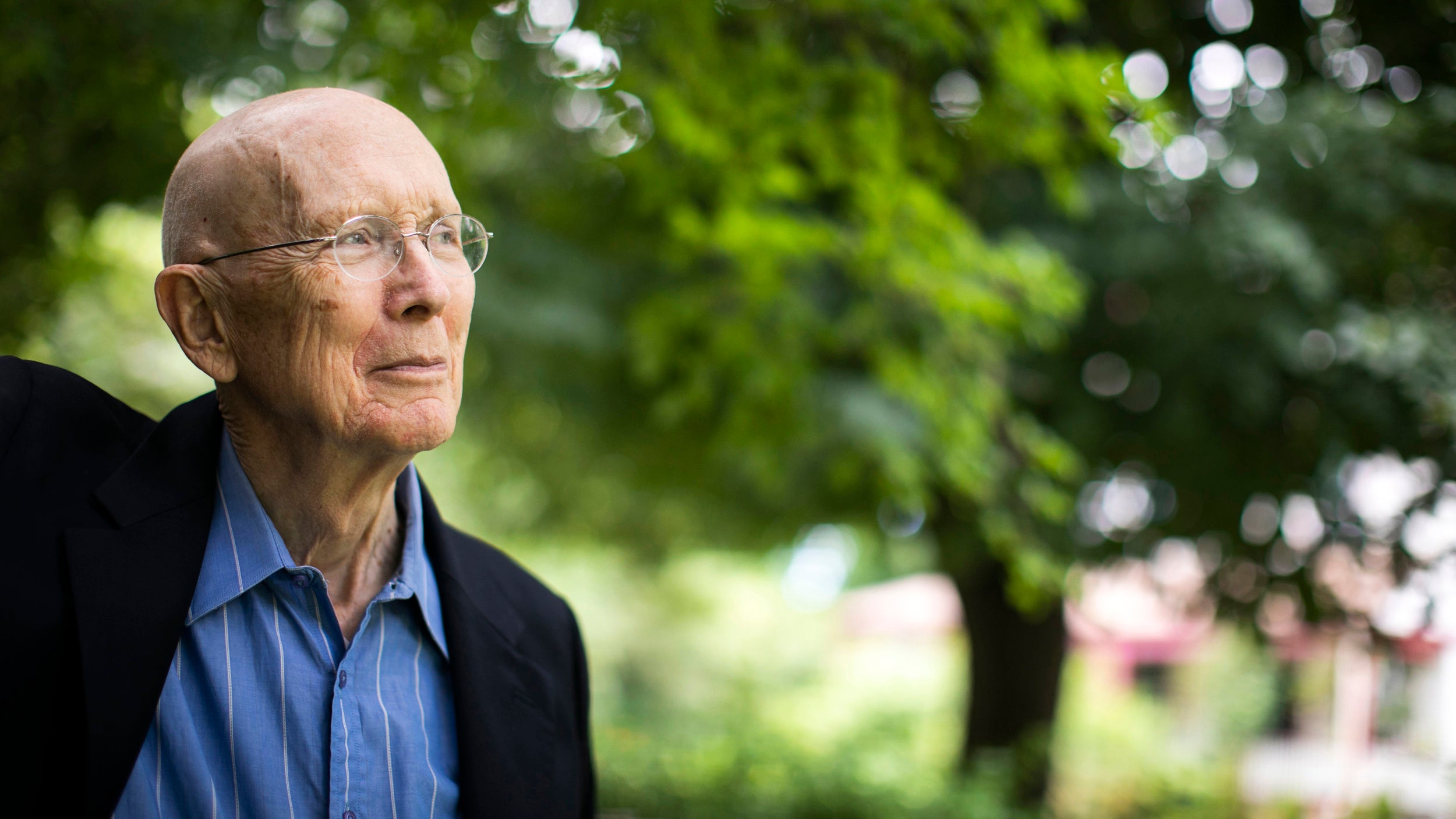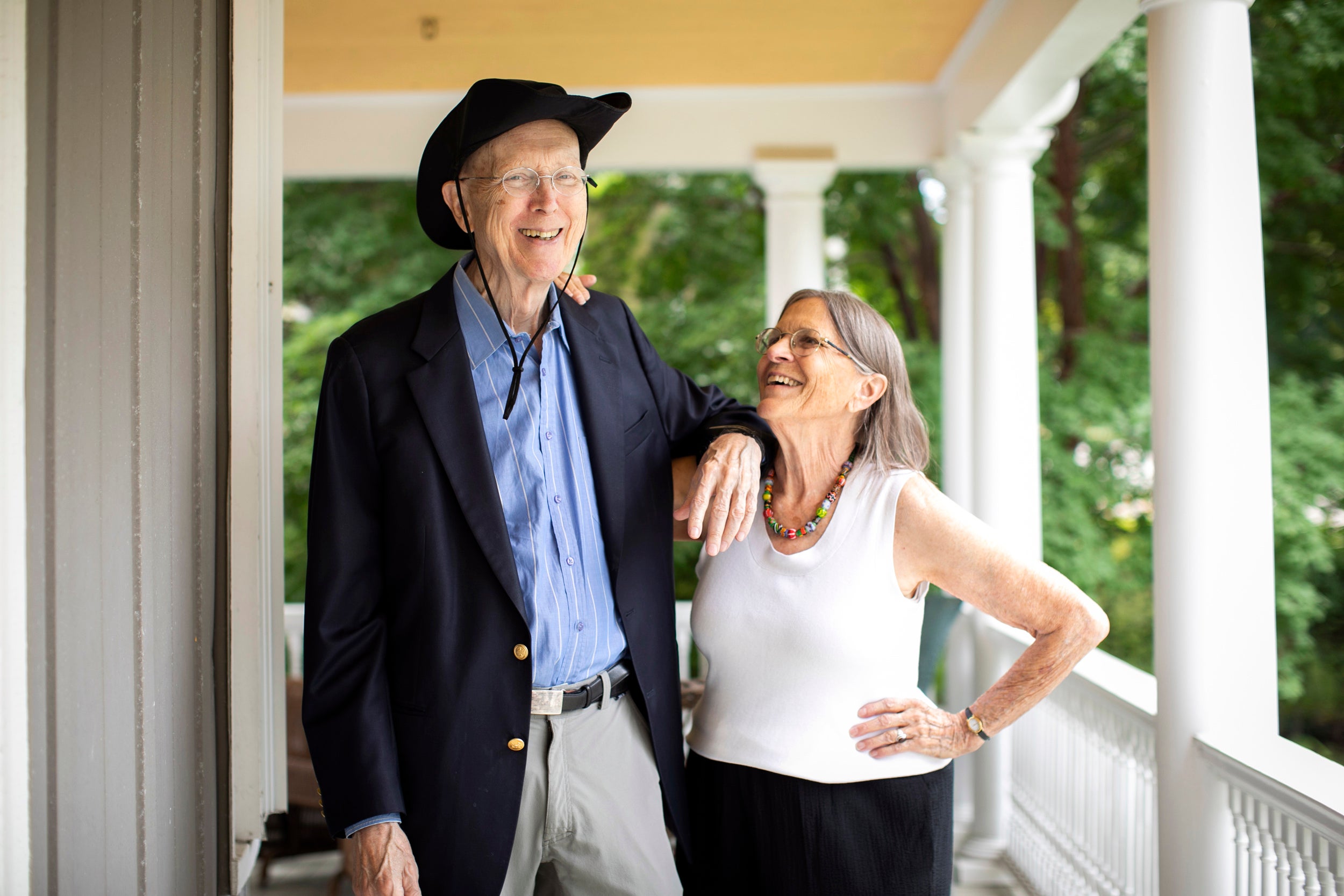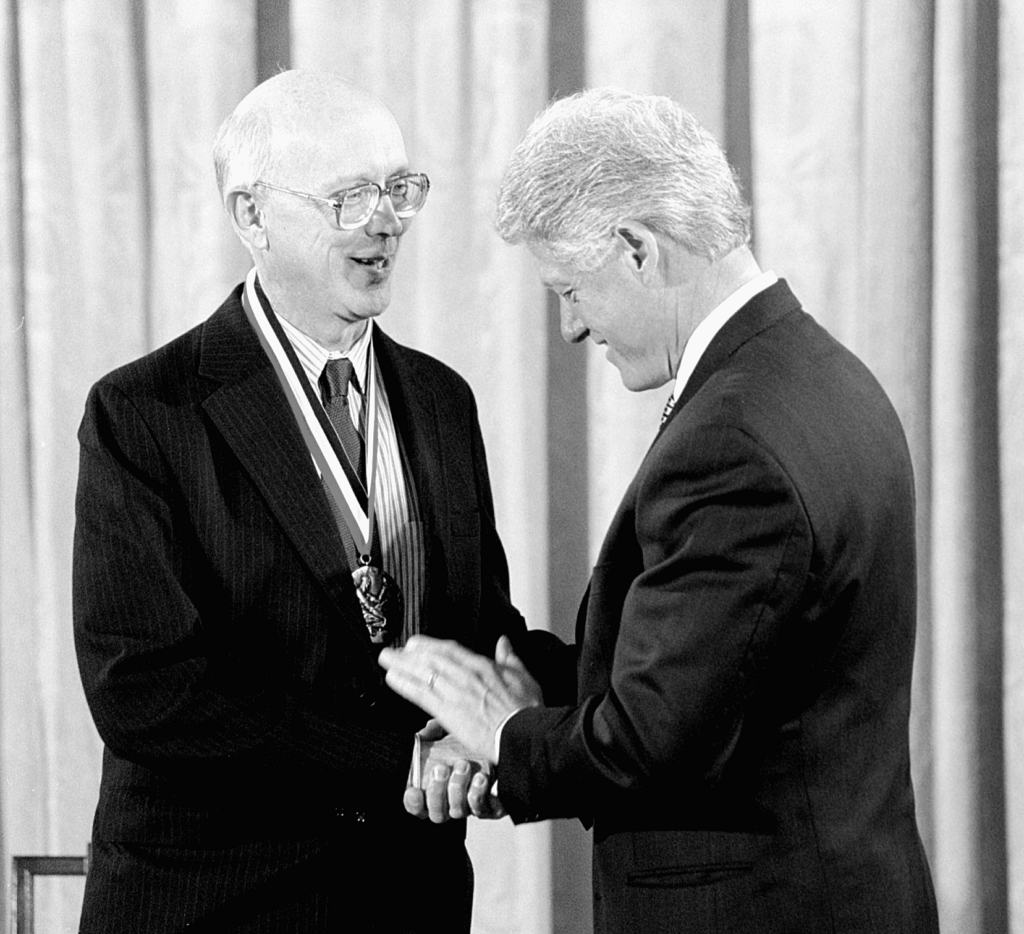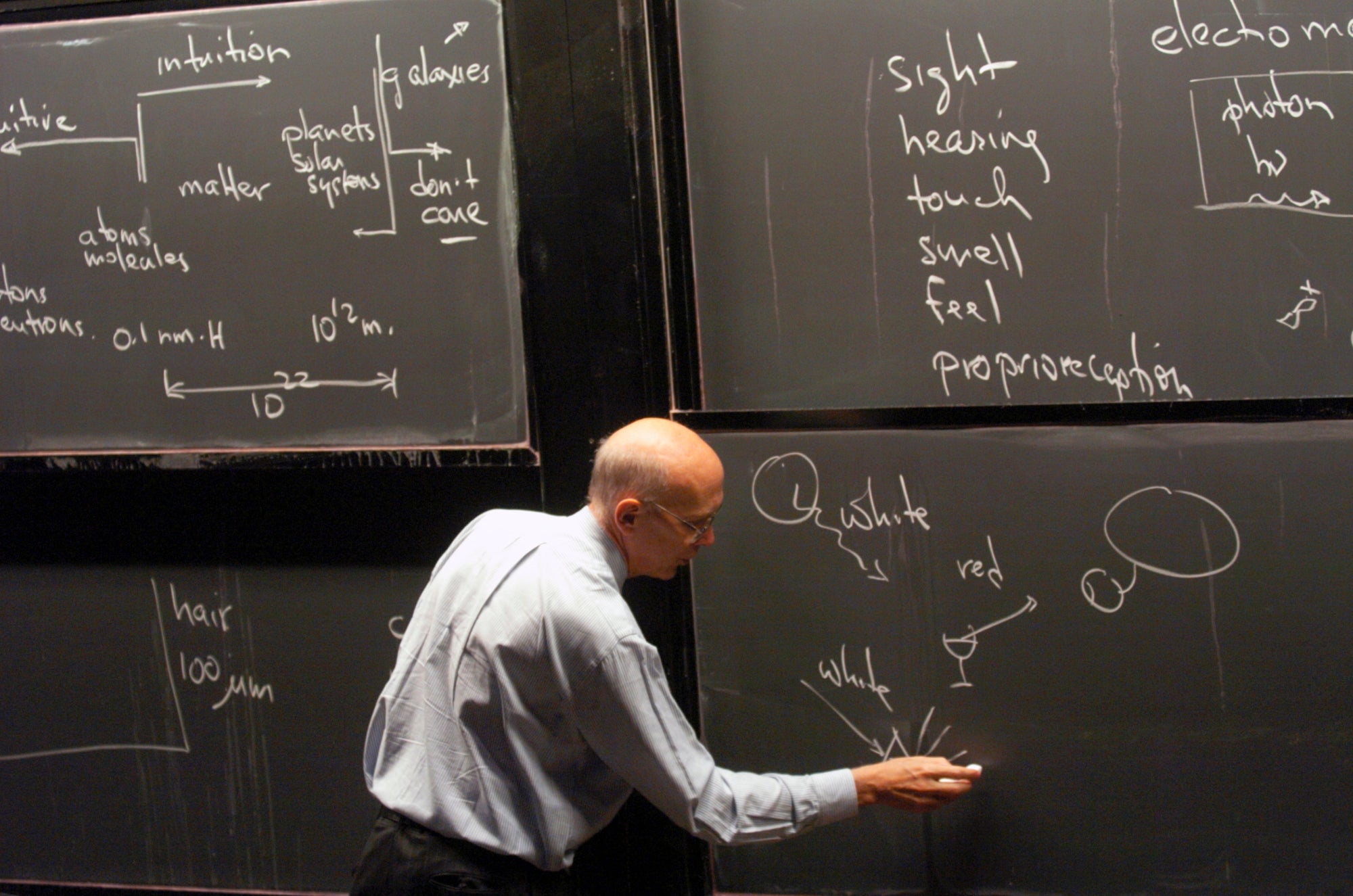Studying ‘why women are interesting, and men are boring’
Nobel laureate Claudia Goldin recounts pioneering career spent tracing major part of U.S. workforce, economy hidden in plain sight
George Whitesides became a giant of chemistry by keeping it simple

Photos by Stephanie Mitchell/Harvard Staff Photographer
Leaders at Harvard in and out of the classroom tell their stories in the Experience series.
When George Whitesides started as a teenage technician in his father’s Kentucky lab in the early 1950s, the bond was immediate — and lasting.
Today one of the world’s most influential chemists, Whitesides, the Woodford L. and Ann A. Flowers University Research Professor, has worked on a wide array of scientific problems, shifting focus periodically to uncharted territory. Over the course of his long career — Harvard College, Cal Tech, MIT, and more than four decades as a researcher and teacher back at Harvard — he’s explored nuclear magnetic spectroscopy, organometallic chemistry, molecular self-assembly, soft robotics, unconventional data storage, microfabrication, nanotechnology, and the origin of life. He has published more than 1,200 scientific articles and holds more than 100 patents, and his many honors include the National Medal of Science. He’s also known for his ability to spin discoveries into new companies, including biotech giant Genzyme, purchased in 2011 by Sanofi.
In a conversation with the Gazette, Whitesides looked back on his life and career. The interview has been edited for clarity and length.
Your interest in chemistry starts in your father’s lab?
I don’t know where it came from. It was always interesting to me that the world was made of atoms and how those atoms combined, and I was a good chemist from the very beginning, so studying chemistry seemed like a sensible thing to do. I assumed I would end up working in the chemical industry.
It must have been a cut above the typical teenage summer job.
It was much more boring than that. I measured the pour-point viscosity of coal tar. You heat it up and put it in a cup. The cup has a hole of calibrated size in it and this very thick liquid dribbles out of the hole. You measure how long it takes for a given amount of liquid to dribble out and record that, then you can calculate from those data pour-point viscosity. It was part of the process of producing a standardized product and was boring to do, but it was also satisfying and something a high school student could manage.
You were at Phillips Andover before enrolling at Harvard. How was that experience?
I enjoyed Andover. I had a couple of teachers who were very good. I learned how to study and I certainly learned some chemistry. It was pretty standard for students who’d done well in prep schools to get early admission to Harvard, which I got. But I was not a star student. I got advanced placement in one course, maybe analytical chemistry. I took the first hour exam and got an F. I took the second hour exam and got an F. That same thing happened for the third hour exam. I don’t remember exactly how long the string went on, but I went to the teacher and said, “What do I do to salvage this? It’s going really badly.” And he looked at me very briefly and said, “Learn the material.” That was a very useful lesson. So I went away and learned the material.
What was Harvard like in the late 1950s?
It was the usual undergraduate experience. I knew it mostly from the collection of courses that I took. I had a good time while I was here but most of the good time came from courses I took and people who took the same courses. The one woman I met would eventually become my wife, Barbara. Her brother was my roommate, arbitrarily assigned at some point.

After Harvard, you headed to Cal Tech.
I ended up in the lab of a guy named Jack Roberts, who turned out to be a perfect fit for me. He was in physical organic chemistry, which made sense. You looked at previous reactions and you learned how they went. Then, if you had a new reaction or a new process, you asked “What is it analogous to?” And you predicted that if all the pieces were the same, the reaction would probably go roughly the same way. And it often did, which made it a pretty logical discipline.
The nice thing about Roberts was that, unlike many research directors, he never told me what to do. I would come up with an idea and do the research. Then I would write a draft of a paper and send him the draft, and he would look at it, correct it — largely the grammar but sometimes the chemistry — and give it back to me. After I’d done the necessary work, I’d give it back to him. This would usually go on for a couple of cycles and then we’d send it off to the journal.
It’s easy to look back at a career and imagine that one step led to another. But when you’re living it, the next step is often not clear. Were there times when you wondered whether you should be doing something other than chemistry?
No. I thought chemistry was pretty straightforward, very general, very interesting, and a good thing to do. I was enjoying it and making some progress.
“I prefer to think that, to the extent that we’ve been successful, it’s because we do stuff that’s simple and useful and solves problems.”
Your focus has shifted periodically from one major area to another. Were those shifts intentional, evolutionary, or accidental?
It was intentional. My central point of instruction to students is this: If somebody else is working on something, don’t work on it. There’s an old saying in chemistry that if somebody else has developed something and you work on it, you are working for them. If you produce an idea and someone else works on it, they’re working for you.
An example of where this has succeeded is in something called self-assembled monolayers. There is a very highly developed chemistry focused on making and observing the smallest causal structures: nanostructures. This fits in a peripheral way with the general importance of nanoscience in making electronic components. But if there are billions of dollars being spent by industry making electronic components, why should a little university research group do that?
So we worked on an alternative way to do this without expensive equipment. We worked out a technique in which you basically take a gold film and dip it in a solution of appropriate chemical. You reliably get a monolayer film one molecule thick. That can then be manipulated using the tools of physical organic chemistry to give you very, very small structures. We’ve made structures that are a couple of angstroms wide and connected in various ways. The reason that’s important is it makes it possible for organic chemists, inorganic chemists, and biochemists to use this technique to enter nanoscience. It’s a technique that everybody can use. I’m a believer in problems and a believer in easy.
You gave a TED talk on the importance of simplicity. With so much science focused on complex problems, how did you come to that view?
Something that’s simple is easier to work with than something that is complicated, and you’re going to make more rapid progress with a simple technique than a complicated one. I don’t like competition just for the sake of competition, but in a sense it’s obvious that if you work on something somebody else is working on, then it’s a competition and you want to be making more rapid progress. But I don’t choose to compete. I choose to work on problems because I think they’re interesting and important.
Is there a philosophy there?
Yes. Do things that are easy to do rather than things that are complicated. You’ll find our laboratory is just like ordinary chemistry laboratories, while a physical chemistry laboratory that works on nanostructures has elaborate equipment that sometimes takes years to build. I don’t want to build elaborate equipment — that’s not my skill.
Is this approach part of the reason you’ve been successful?
Success is in the eye of the beholder. I prefer to think that, to the extent that we’ve been successful, it’s because we do stuff that’s simple and useful and solves problems.
You also do it frugally. You’ve talked in the past about the importance of frugal science in an era when the price tag for science is rising.
You don’t need much more than an evaporator and a beaker. You buy the chemicals you need or you make them yourself because they’re easy to make. And then, the underlying principles are the principles of physical organic chemistry, which makes it relatively easy to predict outcomes and which contributes to the simplicity. What we do is apply physical organic chemistry through techniques that we develop to solve complicated problems, problems that in other hands require complicated equipment or complicated ideas.

Receiving the National Medal of Science from President Bill Clinton in 1998.
Courtesy of George Whitesides
How does idea-generation work in your lab?
We make a list of the 10 most important things we can think of. I’ll suggest specific problems and the students will come up with ways of attacking them. The initial ideas may be mostly mine, but the important ideas are often mostly the students’. The scientist is not in the business of following instructions. Students should experience coming up with an idea and pursuing it themselves.
What do we work on now? We work on the origin of life. We work on “what is magnetism” and what can you do with it? We work on a series of problems related to small structures. And we work on soft robots. Those are all areas that are important, for one or another reason, to some community in the technical world.
You’ve said that the real product of your lab is the students. Your team has generated 1,200 papers, more than 100 patents, and several commercial enterprises. Why is teaching more important than the generation of knowledge?
They’re both important, but the students go out themselves and teach, so there’s an amplification there. Students come to the group and learn a particular style — or develop their own variant of that style. Then they go off and many get academic jobs. They have students, who they teach in their own way, and it goes on from there.
“One of the wonderful things about science is it gives you an enormous scope in not only what you do, but also how you want to do it.”
You’ve had a hand in starting a number of companies and have clearly put an emphasis on making sure things get commercialized. Do you help launch a company and then step back or do you stay involved?
It’s not straightforward. You have to have an idea, you have to have a market, and you have to have people who can deal with the exigencies of a small company.
One thing that’s never been quite clear is how you take bright young people and teach them to be entrepreneurs. You may have a technology but you won’t know whether it has an application until people take your technology and pay you — or the company — to use that product. That’s not what universities do particularly well, but it is what CTOs, CFOs, and CEOs — the people who run the company — do well. So there’s an entirely different part of the story that’s important, which concerns the identification and recruitment of people who can make a small company prosper. And it can take a long time for that to happen.
There are many variables in that process. Is one more important than the others?
People ultimately run the company, but it’s as complicated a problem as doing the research. Often at a small company that is succeeding you find a good application, a good product identification, and a good CEO. And the CEO may often be the one who comes up with a product identification and all the rest. Money is also critical.
And in the end it’s important — with respect to guiding principles — that since funding for your work comes from your neighbors, a benefit goes out to them in some way?
In jobs, which provide income, or in some other way. People generally don’t like just giving away money if they’re going to get nothing in return. We have a system of taxation — and we could argue about its fairness or lack of fairness — but the fact of the matter is people prefer to see something come from their money.

Lecturing at Harvard in 2005.
File photo by Stephanie Mitchell/Harvard Staff Photographer
Students are sometimes told that failure is good for learning. Do you agree?
Certainly, a failure is good for instruction. If you look at the companies we’ve started that have done well, you would find an equal number that have not prospered. Those failures often come from a bad understanding of how the market works.
We recently developed a method for storing information that doesn’t involve electronics but instead uses dyes. That was based on my sense that information storage is an extremely important area but consumes a lot of energy and is subject to hacking. I thought that if you could provide an alternative which didn’t use energy and was not subject to hacking, people would be very interested in finding applications for it. I have so far been wrong. Nobody has shown an appropriate level of interest.
Might that take time to find its application, or is it just a miss?
A lot of small companies don’t go anywhere for quite a while after they get started. When they finally do, what changed is never entirely clear.
A big question you’re working on that has resisted explanation is the origin of life. Why is this problem so difficult?
For starters, you’re not going to make bugs in a test tube, so how do you tell whether you’ve succeeded or not?
The “RNA world” is a leading hypothesis for a plausible way of going from random chemicals — basically generated in outer space and then raining on the Earth — to the components of a living organism. A prime proponent, John Sutherland, thinks that RNA came first, then the RNA somehow propagated the DNA, and you go from there. It makes perfectly respectable sense on paper but you don’t know that it actually happened that way.
We do know, though, that you can make an RNA that way. If you have pools that are acidic and have sulfur in them — because they’re near volcanic fumaroles — and then it rains on them, the rain forms other chemicals. If these pools sit on hot rocks so that there’s heat to do chemistry with, then chemistry will occur and some of it may well produce RNA. But does that mean that that’s the origin of life? Does that mean that that’s the right hypothesis? No, it doesn’t.
These are very legitimate questions and they’re good scientific questions, but there’s a difference between something that could plausibly happen and something that probably did happen.
Do you have a favorite theory?
We’re working on an approach where our preferred source of energy is lightning and we’re learning all sorts of things about chemistry going on in lightning. Instead of making lightning, we make sparks that are energetic, very hot, and have curious things associated with them. A lot of lightning strikes occur over oceans and all around the ocean there are cavities in rocks, which if they get hot, are good places to think about chemistry happening. Now, whether that is the solution to the origin of life is another question.
“My central point of instruction to students is this: If somebody else is working on something, don’t work on it.”
Have your teaching methods changed over the course of your career?
No. We do our own approach and the students, whether they’re graduate students or undergraduate students, are free to say, “I think that is an interesting way of doing things” or “That’s not for me, that’s not the kind of problem I want to solve.” One of the wonderful things about science is it gives you an enormous scope in not only what you do, but also how you want to do it.
Let’s close with the areas of science you find most interesting right now.
You can make a list of maybe 10 or 15 problems and you’ll find that each requires separate ideas to solve. I won’t make any broad generalization about what’s more interesting and what’s less interesting, but I don’t think I want to leave to my grandchildren a world which is significantly hotter than it is now. I do think that it’s a good thing to think about whether the countless stars with planets around them also have countless intelligences on them. There are a wide variety of problems that can make the list. They’re all interesting but they’re all different and it’s not obvious how to solve or even contribute to many of them.